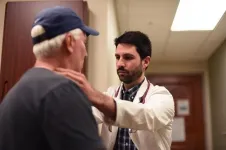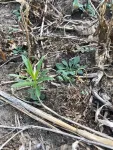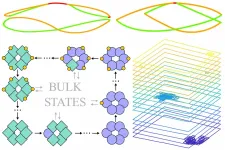(Press-News.org) MUSC Hollings Cancer Center was one of 28 clinical sites around the world that participated in the LOTIS-2 trial to test the efficacy of Loncastuximab tesirine, a promising new treatment for aggressive B-cell lymphoma. The results of the single-arm, phase 2 trial were published online in May 2021 in Lancet Oncology.
Brian Hess, M.D., a Hollings researcher and lymphoma specialist at MUSC Health, was instrumental in bringing the phase 2 trial to Hollings. The manufacturer of Loncastuximab tesirine, ADC Therapeutics S.A., sponsored the trial.
B-cell non-Hodgkin lymphoma (NHL) is a blood cancer that begins in the lymph nodes, spleen or bone marrow. Diffuse large B-cell lymphoma (DLBCL) is the most common subtype of aggressive NHL. New treatment options are vital for patients with DLBCL. While nearly two-thirds of patients have a durable response to frontline therapy, the remaining one-third of patients relapse or are refractory to frontline treatment and typically have a poor prognosis.
The trial was open label, which means the clinician and patient were aware of the treatment that was given, and it was available to patients 18 years or older with relapsed or refractory DLBCL after two or more lines of treatment. This trial is significant because it includes a difficult-to-treat patient population, said Hess.
"Traditional chemotherapy is very unlikely to lead to a sustained response in this patient population. CD19 CAR-T cell therapy is now approved and provides hope for durable response and cure for the majority of these patients; however, not everyone is a candidate for CAR-T cell therapy. In addition, the majority of patients that receive CD19 CAR-T cell therapy eventually relapse and are in need of novel therapies such as loncastuximab," said Hess.
The LOTIS-2 trial tested the efficacy of Loncastuximab tesirine, an antibody-drug complex that targets CD19 - the same molecule targeted on the lymphoma B-cells by CAR-T therapy. The drug complex works by attaching to CD19, widely expressed on lymphoma B cells, and delivering the drug payload into the cell, thereby minimizing systemic toxicity. Once internalized, the drug damages the DNA of the lymphoma cells, leading to cell death.
"This is a novel mechanism of action that provides potential benefit for patients who otherwise do not have a lot of options," said Hess. "For patients who are not candidates for, not interested in, or relapse after CAR-T, this is could be a promising therapy option. Additionally, the drug is delivered intravenously every three weeks, so patient proximity to treatment centers is less critical for this therapy."
The overall response rate in this clinical trial was 48% (70 out of 145 patients). This means that nearly 50% of relapsed DLBCL patients who had already tried two or more treatments had a complete or partial response to this new therapy.
The phase 2 trial result led to Food and Drug Administration (FDA) approval of Loncastuximab tesirine as a single agent. The next step will be to combine it with other agents to see if this improves efficacy and durability of response. This new trial is expected to be open for enrollment at MUSC in the next six months.
"I am excited that this therapy can now be given to patients who may live two to three hours away from Charleston, South Carolina, and not want or be able to travel to MUSC for treatment. We look forward to providing education on the potential efficacy and toxicity of this agent to oncology practitioners throughout the state of South Carolina so that patients can receive this therapy locally," said Hess.
INFORMATION:
About MUSC
Founded in 1824 in Charleston, MUSC is the oldest medical school in the South as well as the state's only integrated academic health sciences center with a unique charge to serve the state through education, research and patient care. Each year, MUSC educates and trains more than 3,000 students and nearly 800 residents in six colleges: Dental Medicine, Graduate Studies, Health Professions, Medicine, Nursing and Pharmacy. The state's leader in obtaining biomedical research funds, in fiscal year 2019, MUSC set a new high, bringing in more than $284 million. For information on academic programs, visit musc.edu.
As the clinical health system of the Medical University of South Carolina, MUSC Health is dedicated to delivering the highest quality patient care available while training generations of competent, compassionate health care providers to serve the people of South Carolina and beyond. Comprising some 1,600 beds, more than 100 outreach sites, the MUSC College of Medicine, the physicians' practice plan and nearly 275 telehealth locations, MUSC Health owns and operates eight hospitals situated in Charleston, Chester, Florence, Lancaster and Marion counties. In 2020, for the sixth consecutive year, U.S. News & World Report named MUSC Health the No. 1 hospital in South Carolina. To learn more about clinical patient services, visit muschealth.org.
MUSC and its affiliates have collective annual budgets of $3.2 billion. The more than 17,000 MUSC team members include world-class faculty, physicians, specialty providers and scientists who deliver groundbreaking education, research, technology and patient care.
About MUSC Hollings Cancer Center
MUSC Hollings Cancer Center is a National Cancer Institute-designated cancer center and the largest academic-based cancer research program in South Carolina. The cancer center comprises more than 100 faculty cancer scientists and 20 academic departments. It has an annual research funding portfolio of more than $44 million and a dedication to reducing the cancer burden in South Carolina. Hollings offers state-of-the-art diagnostic capabilities, therapies and surgical techniques within multidisciplinary clinics that include surgeons, medical oncologists, radiation therapists, radiologists, pathologists, psychologists and other specialists equipped for the full range of cancer care, including more than 200 clinical trials. For more information, visit hollingscancercenter.musc.edu.
Due to the global efforts to meet sustainability standards, many countries are currently looking to replace concrete with wood in buildings. France, for example, will require that all new public buildings will be made from at least 50 percent wood or other sustainable materials starting in 2022.
Because wood is prone to degradation when exposed to sunlight and moisture, protective coatings can help bring wood into wider use. Researchers at Aalto University have used lignin, a natural polymer abundant in wood and other plant sources, to create a safe, low-cost and high-performing coating for use in construction.
'Our new coating has great potential to ...
A new optogenetic tool, a protein that can be controlled by light, has been characterized by researchers at Ruhr-Universität Bochum (RUB). They used an opsin - a protein that occurs in the brain and eyes - from zebrafish and introduced it into the brain of mice. Unlike other optogenetic tools, this opsin is not switched on but rather switched off by light. Experiments also showed that the tool could be suitable for investigating changes in the brain that are responsible for the development of epilepsy.
The teams led by Professor Melanie Mark from the Behavioural Neurobiology Research Group and Professor Stefan Herlitze from the Department ...
As the SARS-CoV-2 virus that causes COVID-19 continues to evolve, immunologists and infectious diseases experts are eager to know whether new variants are resistant to the human antibodies that recognized initial versions of the virus. Vaccines against COVID-19, which were developed based on the chemistry and genetic code of this initial virus, may confer less protection if the antibodies they help people produce do not fend off new viral strains. Now, researchers from Brigham and Women's Hospital and collaborators have created an "atlas" that charts how 152 different antibodies attack a major ...
Many species within Kenya's Tana River Basin will be unable to survive if global temperatures continue to rise as they are on track to do - according to new research from the University of East Anglia.
A new study published in the journal PLOS ONE today outlines how remaining within the goals of the Paris Agreement would save many species.
The research also identifies places that could be restored to better protect biodiversity and contribute towards global ecosystem restoration targets.
Researcher Rhosanna Jenkins carried out the study as part of her PhD at UEA's School of Environmental Sciences.
She said: "This research shows how many species within Kenya's Tana River Basin will be unable to survive if global temperatures continue to rise as they are on track to do.
"But remaining ...
For young soccer players, participating in repetitive technical training activities involving heading during practice may result in more total head impacts but playing in scrimmages or actual soccer games may result in greater magnitude head impacts. That's according to a small, preliminary study released today that will be presented at the American Academy of Neurology's Sports Concussion Conference, July 30-31, 2021.
"Headers are a fundamental component to the sport of soccer. Therefore, it is important to understand differences in header frequency and magnitude across practice and game settings," said study author Jillian Urban, PhD, MPH, of Wake ...
University of Virginia School of Medicine researchers have discovered a previously unknown repair process in the brain that they hope could be harnessed and enhanced to treat seizure-related brain injuries.
Common seizure-preventing drugs do not work for approximately a third of epilepsy patients, so new and better treatments for such brain injuries are much needed. UVA's discovery identifies a potential avenue, one inspired by the brain's natural immune response.
Using high-powered imaging, the researchers were able to see, for the first time, that immune cells called microglia were not just removing damaged material after experimental seizures but actually appeared to be healing damaged neurons.
"There has been mounting generic support for the idea that microglia ...
WESTMINSTER, Colorado - July 23, 2021 - Horseweed is a serious threat to both agricultural crops and natural landscapes around the globe. In the U.S., the weed is prolific and able to emerge at any time of the year.
Fall emerging horseweed overwinters as a rosette, while spring emerging horseweed skips the rosette stage and grows upright. In some instances, both rosette and upright plants emerge simultaneously in mid-summer. These unpredictable growth patterns create challenges for growers as they try to develop an appropriate weed management plan.
In a study featured in the journal Weed Science, a team from Michigan State University explored whether environmental cues could be used to predict horseweed growth ...
A research team led by Dr Rosario Delgado from the UAB Department of Mathematics, in collaboration with the Hospital de Mataró, developed a new machine learning-based model that predicts the risk of mortality of intensive care unit patients according to their characteristics. The research was published in the latest edition of the journal Artificial Intelligence in Medicine, with a special mention as a "Position paper".
Under the framework of Artificial Intelligence, machine learning allows a model to gain knowledge based on the information provided by available ...
When can we say that a certain property of a system is robust? Intuitively, robustness implies that, even under the effect of external perturbations on the system, no matter how strong or random, said property remains unchanged. In mathematics, properties of an object that are robust against deformations are called topological. For example, the letters s, S, and L can be transformed into each other by stretching or bending their shape. The same holds true for letters o, O, and D. However, it is impossible to turn an S into an O without a discontinuous operation, such as cutting the O apart or sticking the two ends of the S together. Therefore, we say that the letters s, S and L have the same topology - as do the letters o, O and D - ...
Chemotherapy has helped make acute lymphoblastic leukemia (ALL) one of the most survivable childhood cancers. Now, researchers working in the U.S., Germany and China have shown how chemotherapy drugs called thiopurines can lead to mutations that set patients up for relapse. The work appears today in the journal Nature Cancer.
The research provides the first direct genomic and experimental evidence in pediatric cancer that drug-resistant mutations can be induced by chemotherapy and are not always present at diagnosis.
"The findings offer a paradigm shift in understanding how drug resistance develops," said Jinghui Zhang, Ph.D., Department of Computational Biology chair at St. Jude Children's Research Hospital. "The ...




